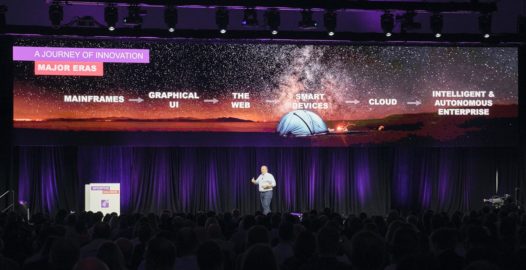Companies in our industry right now are working very hard to prove that they have successfully integrated technologies like the internet of things (IoT) and artificial intelligence (AI) into their enterprise software products. As I described during this interview with Silicon Angle’s TheCube at our World Conference in October, what actually makes these transformational technologies valuable is the simple application program interface (API).
While there’s nothing new about APIs, they’re really coming into sharp focus as a need to get new applications to market increasingly quickly is coupled with a growing demand for ‘digital transformation’ from the c-suite. This is important because IFS Applications is now natively built on, and with Restful APIs. They are at the DNA of our solutions.
APIs for software development
IFS was an early adopter of this method of developing software. In 1998, we became one of the first enterprise software company to re-develop its applications as a component-based architecture. That means that instead of one big, monolithic block of code, our product was built of thousands of small software components, joined together by APIs. These APIs essentially define how different pieces of software work together. Because that working relationship is well-defined and established, it became easy and fast for IFS to make changes to the software. One component could be changed as needed without disrupting the whole.
We can liken this to the way your web browser interacts with resources on the Internet. Regardless of what web domain you are interacting with or how that content was developed, you can still successfully access that content regardless of whether you are using Google Chrome, Mozilla Firefox, Opera or Netscape (well, Netscape maybe not so much). The Internet works because there are well-defined and open standards that developers can easily understand and follow.
APIs have reached new heights since the early days of component-based architecture and the web of course. A lot of what we are using for APIs now was inspired by the dissertation of Roy Fielding, published at the turn of the century in 2000, who originated the idea of the representational state transfer, or RESTful, API. These have some technical advantages, but the main one is that it makes APIs easier to use, and easier for other systems to discover what resources that API can provide to them.

APIs for extending software
And it is this intuitive nature that makes RESTful APIs so desirable today. Even manufacturers and services companies today are, in many ways, becoming software companies themselves. They may have developers who write software to do things like open our applications to their customers or suppliers, introduce data from the IoT, and enable other systems to interact with our software in new and useful ways. And RESTful APIs make it that much easier for them to get access to a lot of the capabilities that live inside of the IFS models.
Our longtime commitment to this way of writing software and delivering value is one reason we joined the Open API Initiative. And our involvement will help us align our APIs with current and emerging standards for what is proving to be the language technologies use to talk to each other.
At IFS we are demonstrably serious about this commitment and we have gone all the way. We are not just building a select set of APIs “on-the-side”. Our core architecture is dependent on OData based Restful APIs; it’s the entire foundation for how our front–end works. Every form, every interaction goes through oData based Restful APIs. It is a firm commitment that delivers choice, flexibility and capabilities to our end user customers.… and we don’t have to produce, and document API guides separate from the core product. APIs is at the core of our architecture.
Check out the full interview here.
Do you have questions or comments?
We’d love to hear them so please leave us a message below.
Diksha Kakade
It is indeed an amazing blog post on IoT. Thank you for such an amazing blog. Keep posting such useful blogs.
Steve
Nice blog about APIs within IFS. What is not clear, at least to me, where examples can be found about how to implement. community.ifs.com has a number of questions that are similar.